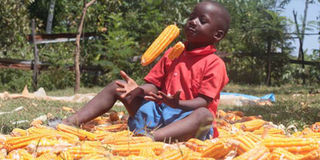Researchers give nod to GM maize trials

Emanuel Ber plays with yellow maize at their home in Rachuonyo, Homa Bay County, on January 19, 2016. National Biosafety Authority has approved cultivation trials for GMO maize which scientists say can allow us to grow more food on less land in an economically and environmentally sustainable way. PHOTO | TOM OTIENO | NATION MEDIA GROUP
What you need to know:
- A public-private consortium behind the scientific development of drought and pest resistant high yielding maize varieties says last week’s approval for national field trials is the way to go.
- The three-year trial led to development of Bt maize varieties that effectively controlled maize infestation and damage by the two major pests.
A public-private consortium behind the scientific development of drought and pest resistant high yielding maize varieties says last week’s approval for national field trials is the way to go.
Acting Kenya Agricultural Livestock and research Organisation (Kalro) Director General Eliud Kiplimo, and the African Agricultural Technology Foundation (AATF) Executive Director Denis Kyetere said they would immediately embark on the next step of identifying suitable varieties for various regions that are adversely affected by stem borers.
“This will help farmers harvest enough to feed their families and get a surplus, which they can sell to increase their incomes, thereby strengthening local communities,” said Dr Kyetere.
BRIGHT FUTURE
Dr Kiplimo said success of the Wema Bt maize portends a bright future for agriculture, where the government could give science a central role in providing solutions to food shortages and fighting pests and diseases.
“It will inject new interest in using scientific innovations and fast-track adoption of appropriate technologies to address national food security,” he said when he disclosed the new development to researchers currently meeting in Dar es salaam to review the project’s progress.
AATF and Kalro launched scientific trials after socio-economic studies showed the spotted stem borer (Chilo partellus) and the African Stem Borer (Busseola fusca) wreaked havoc across maize plantations, causing smallholder farmers a Sh9 billion loss, equivalent to 400,000 bags of maize, which then forced the government to import the staple.
CONTROLLED MAIZE INFESTATION
The three-year trial led to development of Bt maize varieties that effectively controlled maize infestation and damage by the two major pests.
The NPT process, they said, would take two years as the variety release process takes about two planting seasons before the maize is eventually reaches farmers.
It is after the trials and testing that the minister for Agriculture sanctions release of proven Bt Maize varieties suitable for the various regions for propagation and sale to growers.
The statement said Kenyan and African farmers need a range of options including access to GM technology that could increase their yields and help Kenya fight food insecurity.
The first GM crop testing began in the 1980s and there have now been more than 2,500 regulatory approvals granted by 60 countries on more than 300 products globally.





